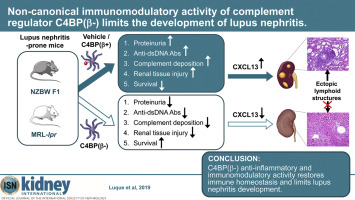当前位置:
X-MOL 学术
›
Kidney Int.
›
论文详情
Our official English website, www.x-mol.net, welcomes your feedback! (Note: you will need to create a separate account there.)
Noncanonical immunomodulatory activity of complement regulator C4BP(β-) limits the development of lupus nephritis.
Kidney International ( IF 19.6 ) Pub Date : 2019-11-06 , DOI: 10.1016/j.kint.2019.10.016 Ana Luque 1 , Inmaculada Serrano 1 , Elia Ripoll 2 , Catarina Malta 1 , Montserrat Gomà 3 , Anna M Blom 4 , Josep M Grinyó 2 , Santiago Rodríguez de Córdoba 5 , Joan Torras 2 , Josep M Aran 1
Kidney International ( IF 19.6 ) Pub Date : 2019-11-06 , DOI: 10.1016/j.kint.2019.10.016 Ana Luque 1 , Inmaculada Serrano 1 , Elia Ripoll 2 , Catarina Malta 1 , Montserrat Gomà 3 , Anna M Blom 4 , Josep M Grinyó 2 , Santiago Rodríguez de Córdoba 5 , Joan Torras 2 , Josep M Aran 1
Affiliation

|
Lupus nephritis is a chronic autoimmune-inflammatory condition that can lead to end-stage kidney disease. Presently available immunosuppressive treatments for lupus nephritis are suboptimal and can induce significant side effects. Recently, we characterized a novel immunomodulatory activity of the minor isoform of the classical pathway complement inhibitor, C4BP(β-). We show here that C4BP(β-) treatment prevented the development of proteinuria and albuminuria, decreased significantly the formation of anti-dsDNA antibodies and, locally, mitigated renal glomerular IgG and C3 deposition and generation of apoptotic cells. There was a consequent histological improvement and increased survival in lupus-prone mice. The therapeutic efficacy of C4BP(β-) was analogous to that of the broad-acting immunosuppressant cyclophosphamide. Remarkably, a comparative transcriptional profiling analysis revealed that the kidney gene expression signature resulting from C4BP(β-) treatment turned out to be 10 times smaller than that induced by cyclophosphamide treatment. C4BP(β-) immunomodulation induced significant downregulation of transcripts relevant to lupus nephritis indicating immunopathogenic cell infiltration, including activated T cells (Lat), B cells (Cd19, Ms4a1, Tnfrsf13c), inflammatory phagocytes (Irf7) and neutrophils (Prtn3, S100a8, S100a9). Furthermore, cytokine profiling and immunohistochemistry confirmed that C4BP(β-), through systemic and local CXCL13 downregulation, was able to prevent ectopic lymphoid structures neogenesis in aged mice with lupus nephritis. Thus, due to its anti-inflammatory and immunomodulatory activities and high specificity, C4BP(β-) could be considered for further clinical development in patients with systemic lupus erythematosus.
中文翻译:

补体调节因子C4BP(β-)的非规范性免疫调节活性限制了狼疮性肾炎的发展。
狼疮性肾炎是一种慢性自身免疫炎性疾病,可导致终末期肾脏疾病。目前可获得的狼疮性肾炎的免疫抑制治疗不是最理想的,并且可以引起明显的副作用。最近,我们表征了经典途径补体抑制剂C4BP(β-)的次要亚型的新型免疫调节活性。我们在这里显示,C4BP(β-)治疗可防止蛋白尿和蛋白尿的发展,显着降低抗dsDNA抗体的形成,并局部减轻肾小球IgG和C3的沉积以及凋亡细胞的产生。结果狼疮易感小鼠的组织学改善,存活率提高。C4BP(β-)的治疗功效与广谱免疫抑制剂环磷酰胺相似。值得注意的是 对比转录谱分析表明,C4BP(β-)处理产生的肾脏基因表达签名比环磷酰胺处理诱导的肾脏基因表达签名小10倍。C4BP(β-)免疫调节诱导与狼疮性肾炎有关的转录物显着下调,表明免疫病理性细胞浸润,包括活化的T细胞(Lat),B细胞(Cd19,Ms4a1,Tnfrsf13c),炎性吞噬细胞(Irf7)和嗜中性白细胞(Prtn3,S100a8, S100a9)。此外,细胞因子分析和免疫组织化学证实,C4BP(β-)通过全身和局部CXCL13下调,能够预防狼疮性肾炎衰老小鼠的异位淋巴结构新生。因此,由于其抗炎和免疫调节活性以及高特异性,
更新日期:2019-11-07
中文翻译:

补体调节因子C4BP(β-)的非规范性免疫调节活性限制了狼疮性肾炎的发展。
狼疮性肾炎是一种慢性自身免疫炎性疾病,可导致终末期肾脏疾病。目前可获得的狼疮性肾炎的免疫抑制治疗不是最理想的,并且可以引起明显的副作用。最近,我们表征了经典途径补体抑制剂C4BP(β-)的次要亚型的新型免疫调节活性。我们在这里显示,C4BP(β-)治疗可防止蛋白尿和蛋白尿的发展,显着降低抗dsDNA抗体的形成,并局部减轻肾小球IgG和C3的沉积以及凋亡细胞的产生。结果狼疮易感小鼠的组织学改善,存活率提高。C4BP(β-)的治疗功效与广谱免疫抑制剂环磷酰胺相似。值得注意的是 对比转录谱分析表明,C4BP(β-)处理产生的肾脏基因表达签名比环磷酰胺处理诱导的肾脏基因表达签名小10倍。C4BP(β-)免疫调节诱导与狼疮性肾炎有关的转录物显着下调,表明免疫病理性细胞浸润,包括活化的T细胞(Lat),B细胞(Cd19,Ms4a1,Tnfrsf13c),炎性吞噬细胞(Irf7)和嗜中性白细胞(Prtn3,S100a8, S100a9)。此外,细胞因子分析和免疫组织化学证实,C4BP(β-)通过全身和局部CXCL13下调,能够预防狼疮性肾炎衰老小鼠的异位淋巴结构新生。因此,由于其抗炎和免疫调节活性以及高特异性,



























 京公网安备 11010802027423号
京公网安备 11010802027423号